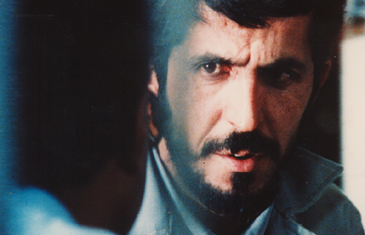
There is nothing sensational that can be found on the surface of an Abbas Kiarostami film. For the excitable viewer, his films can be frustratingly dry, but for the patient viewer, they are profoundly rewarding. It is in the fact that his films don't beg for attention that one can provide reasoning for deeming his work as "high art". Fittingly, Kiarostami is also an extremely humble individual. In his interviews, he views his films with an open mind, accepting of all outside interpretations and even questioning his own. Close-Up, he said, was the first film that he actually sat down in the cinema for, viewed unabated, and liked. And, well, he should like it, because aside from its considerable technical flaws, it is an ingenious character study. There is absolutely no shortage of imagination.
It tells the story of a struggling lower class Iranian man who, in a desperate attempt to liberate himself from his suffering both financially and personally, acts for a day as the famous Iranian filmmaker Mohsen Makhmalbaf. His behaviors, which include sharing a bus ride with an Iranian mother and a copy of Makhmalbaf's novel/film The Cyclist and visiting her home to speak to her sons about his work as an artist, are intercut with the court case that follows. Hossain Sabzian is the man's name, and he was arrested for attempted fraud. Sabzian sheds light on his intentions in the claustrophobic court room, which works to localize a wide variety of demographically distinct Iranian people. He admires Makhmalbaf greatly for his willingness to "portray the sufferings of ordinary people".
He is filmed almost completely in close up in these scenes, as there is a film crew recording his unusual case in the interest of cinema. These scenes acquire a harsh documentary feel with dismal 16mm footage. Sabzian's concerns are self-liberation through the arts and the need to care for his family during difficult times. His reasons for acting as Mahkmalbaf are baffling, compelling, and relatable. The story's power lies entirely on the shoulders of Sabzian: his downfalls are tragic and his emancipations are uplifting. A character so powerful contains the ability to pierce through technical blemishes such as poor audio and obtuse lighting. A viewer cannot watch Close-Up with the expectation of seeing stunning cinematic bravado; rather, the virtue of the film is its lyrical humanism.

No comments:
Post a Comment